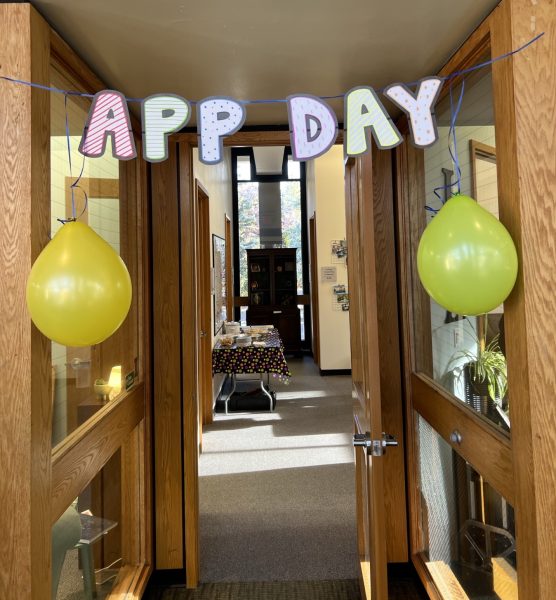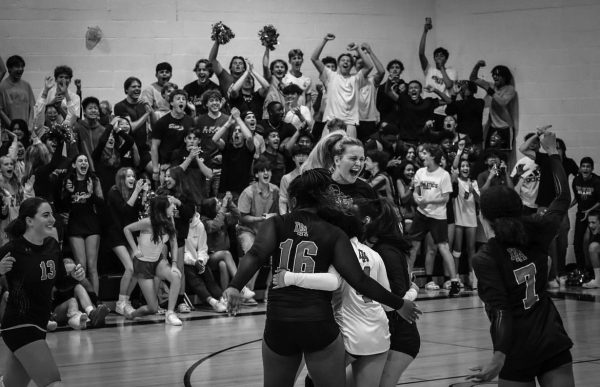The struggle of balancing religion and school
Photo by Estelle Rosenblatt
Apples and honey are set out for the celebration of Rosh Hashanah.
November 10, 2022
At LFA, it’s unusually hard to find a stable balance between school and religion. It is bound to happen that some religious holidays will fall on a school day. Students who practice that religion must make a choice: go to school or stay home and observe the holiday. Already a difficult decision to make, LFA further contributes to the dilemma. Students that miss class could fall behind, and occasionally, teachers are not as understanding about an absence as students would like them to be.
Holidays Rosh Hashanah and Yom Kippur were in early September this year. Local high schools New Trier (Winnetka) and Highland Park annually have classes off for both of these holidays. So…why doesn’t LFA take the days off as well? Given that Lake Forest Academy has a significant religiously-diverse student population, it is not easy for the school to cancel class for every holiday. While a fair reason, LFA can do more to accommodate religious students without canceling school. The Dean of Pluralism and Multicultural Affairs, Lusanda Mayikana, sends an email months before holidays telling teachers that some students might miss school. Many teachers still schedule tests, quizzes, and important labs on days they know students will be missing. When teachers ignore these emails, students regard the lack of understanding and feel they aren’t being set up for success.
As one of the few faculty with a Jewish background, (but having had a mixed upbringing), Mandy Krause struggles with watching students deal with the emotional strain of feeling exhausted by the process necessary to take off for a holiday, especially since she felt put out by that same feeling in high school and thus avoided taking off. Krause agreed, “It is unnecessary for us [teachers] to knowingly schedule tests on those days, especially when we are sent emails way in advance that have the dates of holidays, and it’s in the LFA planner. I understand that it’s difficult to schedule around every holiday, but I find it frustrating that so many distribute major assessments on days they know students will be physically gone. It forces students to feel like they’re a problem just following what may be their families’ expectation and perhaps part of their identity.”
There are many students who choose to attend school on a religious holiday because making up a day’s worth of school work ends up being less convenient than attending school in the first place. Camryn Farbman ‘24 is a Jewish student who this year, attended school over the holidays. On dealing with judgments from teachers and families, Farbman said, “When going to dinner with family after the school day, they were very judgmental that I went to school instead of going to temple.” This struggle is present in many families, often creating a divide between student and parents or even among siblings who might make different choices.
As a teacher, Krause said that she “understands the complexities around families, holidays, and that how people practice is not always the same.” She recalled, “Once I took off for the holiday and was reprimanded at school since I ‘hadn’t gone to temple.’ I didn’t actually get in trouble, but the experience made me really uncomfortable, so I understand student discomfort.” Similarly to students, teachers also find it difficult to make the right decision: to go to work, or celebrate out of school. There is a sense of guilt attached to such decisions, either decision will lead you to miss something important.
Farbman addresses the troubles she faced during school and the following day. After missing school students are expected to be ready for a test or have projects due the very next day. Like many others, Farbman thinks that most teachers won’t understand the importance of a holiday to her family. She “feels bad using it (religion) as an excuse” and decides to disrupt the evening of her celebration to finish work. This is a typical theme, in fact almost every student worries that their teachers wont understand why they’re missing school, and are forfeiting more of their holiday to keep up with work.
Making the choice to go or stay home for a holiday is difficult. Given that students feel a general sense of disregard after missing only one day, LFA has an ability and responsibility to reduce the problem. Teachers can better accommodate students’ expecting absences by adjusting the scheduling of major class assessments. At the end of the day, there is no wrong choice to make, but there should be no academic pressures influencing students’ personal choices.
















